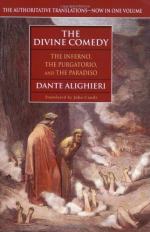The old and new, is yours: and for your guide
The shepherd of the church let this suffice
To save you. When by evil lust entic’d,
Remember ye be men, not senseless beasts;
Nor let the Jew, who dwelleth in your streets,
Hold you in mock’ry. Be not, as the lamb,
That, fickle wanton, leaves its mother’s milk,
To dally with itself in idle play.”
Such were the words that Beatrice spake:
These ended, to that region, where the world
Is liveliest, full of fond desire she turn’d.
Though mainly prompt new question to propose,
Her silence and chang’d look did keep me dumb.
And as the arrow, ere the cord is still,
Leapeth unto its mark; so on we sped
Into the second realm. There I beheld
The dame, so joyous enter, that the orb
Grew brighter at her smiles; and, if the star
Were mov’d to gladness, what then was my cheer,
Whom nature hath made apt for every change!
As in a quiet and clear lake the fish,
If aught approach them from without, do draw
Towards it, deeming it their food; so drew
Full more than thousand splendours towards us,
And in each one was heard: “Lo! one arriv’d
To multiply our loves!” and as each came
The shadow, streaming forth effulgence new,
Witness’d augmented joy. Here, reader!
think,
If thou didst miss the sequel of my tale,
To know the rest how sorely thou wouldst crave;
And thou shalt see what vehement desire
Possess’d me, as soon as these had met my view,
To know their state. “O born in happy
hour!
Thou to whom grace vouchsafes, or ere thy close
Of fleshly warfare, to behold the thrones
Of that eternal triumph, know to us
The light communicated, which through heaven
Expatiates without bound. Therefore, if aught
Thou of our beams wouldst borrow for thine aid,
Spare not; and of our radiance take thy fill.”
Thus of those piteous spirits one bespake me;
And Beatrice next: “Say on; and trust
As unto gods!”—“How in the
light supreme
Thou harbour’st, and from thence the virtue
bring’st,
That, sparkling in thine eyes, denotes thy joy,
I mark; but, who thou art, am still to seek;
Or wherefore, worthy spirit! for thy lot
This sphere assign’d, that oft from mortal ken
Is veil’d by others’ beams.”
I said, and turn’d
Toward the lustre, that with greeting, kind
Erewhile had hail’d me. Forthwith brighter
far
Than erst, it wax’d: and, as himself the
sun
Hides through excess of light, when his warm gaze
Hath on the mantle of thick vapours prey’d;
Within its proper ray the saintly shape
Was, through increase of gladness, thus conceal’d;
And, shrouded so in splendour answer’d me,
E’en as the tenour of my song declares.




